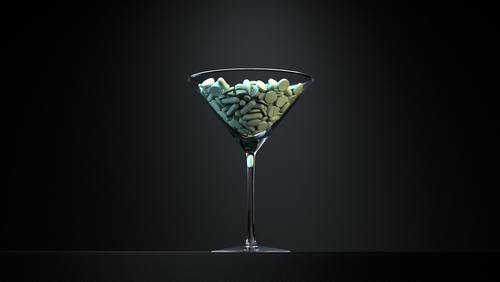If you live with alcohol use disorder (AUD), then you could be wondering if anti-alcohol drugs are an option for you in recovery.
There’s been lots of press about medication-assisted treatment (MAT) in treating opioid addiction, but less news about the same drugs used to treat AUD. These medications can reduce cravings, relieve withdrawal, or limit your body’s ability to tolerate alcohol.
Generally, treatment with MAT is more effective than treatment that doesn’t use it. AUD is a disorder with powerful physical effects that can make relapses feel inevitable.
Many people with AUD do better on medication combined with therapy or counseling programs. One study found that naltrexone treatment reduced AUD relapses from 60% to 38%.
What Are Anti-Alcohol Drugs?
There are only four medications that the Food and Drug Administration (FDA) approves for alcohol use disorder treatment, but there are others that are used off-label. Right now, the FDA approves medications that contain acamprosate, disulfiram, or naltrexone.
Off-label drugs are safe and effective at relieving the effects of AUD. They may work in three ways:
- By relieving symptoms of alcohol withdrawal
- By eliminating cravings for alcohol
- By causing a physical reaction when you drink
The FDA-approved drugs used for their anti-alcohol effect include:
- Antabuse, or disulfiram
- Campral, or acamprosate
- Vivitrol, the injectable form of naltrexone
- Revia, the tablet form of naltrexone
Drugs that aren’t approved by the FDA for AUD treatment, but are still effective include:
- Baclofen, or Gablofen
- Topamax, or topiramate
MAT drugs work best when you mix them with a counseling or therapy program. Alone, MAT drugs may lessen your urge to use alcohol, but they don’t address the behavioral changes that happen in AUD. Without a counseling program, your MAT may not be as effective as it could be.
Antabuse
Antabuse is the brand name for disulfiram. It’s an FDA-approved treatment for AUD.
When you take disulfiram, it decreases your body’s ability to process alcohol. The result is physical sickness that happens after you drink alcohol, and this can act as a powerful deterrent.
When you’re taking Antabuse, drinking alcohol may cause:
- Nausea
- Vomiting
- Flushing
- Heart palpitations
Drinking only a minute amount of alcohol is enough to trigger a reaction. You should not drink any alcohol at all while on this medication.
Heavy drinking while on Antabuse can cause:
- Trouble breathing
- Heart problems, including heart attack or heart failure
- Unconsciousness or coma
- Seizures
- Death
Most people get so sick from a few drops of alcohol while on this medication that heavy drinking isn’t possible. Still, heavy drinking while on Antabuse can cause death. If you’re using this medication, it’s vital to avoid heavy drinking.
These unpleasant and possibly dangerous effects are enough motivation for most people to stop drinking alcohol.
Who Should Use Antabuse?
Antabuse is an option for people who:
- Have finished withdrawing
- Are enrolled in a treatment program
Side Effects of Antabuse
Like any drug, Antabuse has side effects. They include:
- Drowsiness
- Tiredness
- Skin Rash
- Acne
- Mild Headache
- Liver disease
- Psychosis
If you have a history of diabetes, liver disease, heart disease, brain damage, or seizures, then your doctor may recommend that you avoid this medication. These conditions can increase the risk of adverse side effects.
Baclofen
Baclofen is a muscle relaxer and anti-seizure drug that’s used off-label to treat AUD. It works by reducing anxiety and cravings, two factors that can severely affect your risk of relapse.
One study found that low-dose baclofen reduced daily drinking by 53%. In the same study, high-dose baclofen decreased daily alcohol use by 68%. Baclofen may work by reducing your tendency to have obsessive thoughts about alcohol.
Who Should Use Baclofen?
It’s typically a safer choice for people with liver or heart issues since it’s less likely to cause side effects than other MAT drugs.
Side Effects of Baclofen
Still, baclofen may have some side effects. They include:
- Dizziness
- Headache
- Nausea
- Sleeping problems
- Weakness
Rarely, some people may have severe side effects from this drug. Call your doctor if you experience seizures, confusion, hallucinations, or trouble breathing. These can be signs of a life-threatening reaction.
Topamax
Topamax is the brand name for topiramate, a seizure medication that doctors use off-label to treat AUD.
This drug works by reducing the amount of dopamine that you get from drinking.
Dopamine is a chemical that is linked to feelings of reward. It’s the reason that you feel euphoric when you drink, and when you get less dopamine from drinking, you’ll naturally want to drink less.
Topamax is very effective at treating AUD even though it’s not yet FDA-approved. In fact, the United States military’s Psychological Center for Excellence recommends Topamax as a first-line treatment for AUD.
Research has shown that Topamax has significant effects on:
- Your number of drinking days
- Your number of heavy drinking days
- The number of drinks per drinking day
Who Should Use Topamax?
Topamax is a first-line choice for anyone with moderate or severe AUD who wants to stop drinking. Even people who don’t respond to naltrexone or Campral usually respond to Topamax.
Side Effects of Topamax
Look out for side effects while taking Topamax. They may include:
- Anorexia
- Cognitive changes
- Numbness
- Rashes
- Trouble tasting
You should not take Topamax if you have a history of eating disorders.
Vivitrol
Vivitrol is the injectable version of naltrexone, a medication used in MAT for alcohol and opioids. It’s the first non-addictive MAT treatment to be developed.
Most patients take Vivitrol once monthly at their doctor’s office. It works by blocking the alcohol receptors in your brain, making it less pleasurable to drink. Most people on Vivitrol lack cravings, and if they do drink, they don’t find it rewarding enough to do it again. You’re much less likely to relapse while using Vivitrol.
Who Should Use Vivitrol?
Vivitrol is a good choice for people who have already gone through alcohol detox and aren’t using other drugs, like opioids. You must not have alcohol in your system when you start taking Vivitrol, or it won’t work and will make you experience immediate withdrawal.
You shouldn’t take Vivitrol if you have a history of liver problems. Vivitrol can cause acute liver failure and hepatitis in people who are at risk.
Side Effects of Vivitrol
Vivitrol does have a few side effects that can occur while using the medication.The side effects of Vivitrol can include:
- Dizziness
- Headache
- Fatigue
- Nausea and vomiting
- Muscle and joint pain
Revia
Revia is the oral tablet version of naltrexone. It’s FDA-approved to treat AUD by reducing cravings and reducing the psychological reward of drinking.
There’s a variation of dosing schedules based on your needs and whether you’re receiving supervised treatment. Some people take Revia daily, every other day, or every third day.
Like other forms of naltrexone, you must be alcohol-free before you start to use Revia. Starting Revia while having alcohol in your system causes immediate withdrawal.
Who Should Use Revia?
Revia is a good choice for people who are currently receiving supervised treatment or who are in a substance abuse treatment program.
Revia is also a good choice for those who also abuse opioids along with alcohol. It is designed to suppress cravings for both. Taking Revia an hour before drinking significantly reduces cravings and the number of times one drinks.
Side Effects of Revia
The adverse side effects from Revia can include:
- Dizziness
- Fatigue
- Headache
- Nausea
- Sleepiness
You should not take Revia if you’re still using alcohol or if you have a history of liver problems.
Campral
Campral is the brand name for acamprosate, a drug that affects your desire to drink by changing the chemical balance in your brain.
People who take Campral along with counseling may have an easier time choosing not to drink. This medication significantly reduces alcohol cravings in trials.
Who Should Use Campral?
Campral should be used by people who have already given up drinking. It does not work for people who still continue to drink. It also doesn’t work to ease withdrawal effects of alcohol.
Instead, it helps to reduce cravings of alcohol after one has stopped drinking. It can be helpful to those who are feeling anxiety, restlessness and insomnia since giving up alcohol.
Side Effects of Campral
Call your doctor if you have any of these serious side effects:
- Heart palpitations
- Mood changes
- Swelling in limbs
- Suicidal thoughts
Other side effects from Campral include:
- Appetite problems
- Dizziness
- Dry mouth
- Numbness
- Sleeping problems
- Stomach discomfort
Talk to your doctor if you have kidney problems. If you have low kidney function, you may need a lower dose to prevent damage. People with severe kidney damage should not use Campral.
Are Anti-Alcohol Drugs Effective?
Anti-alcohol drugs are effective at reducing your need to drink. Together with a quality treatment program, anti-alcohol drugs can ease withdrawal effects and reduce cravings, making it easier to stay off of alcohol.
Research shows that people who use MAT:
- Drink on fewer days
- Drink less per session
- Are less likely to relapse
- Have fewer cravings
- Report less rewarding experiences when they do drink
Beat Addiction With Medication-Assisted Treatment for AUD
When it’s combined with a complete treatment plan for AUD, MAT is an effective way to beat addiction.
In many cases, you’ll start your MAT regimen during an inpatient or outpatient treatment stay. This is an opportunity for you and your treatment team to find an MAT option that works for you and keeps your disorder in check.
Medication for alcohol abuse works best when it’s combined with other evidence-based treatments. Some include:
- Cognitive-behavioral therapy to help you unpack your thoughts and behaviors and understand yourself better.
- Dialectical behavior therapy, which encourages you to stay through uncomfortable moments and cope with them without grabbing a bottle.
- Internal family systems therapy to help you understand and work on the complex parts of yourself.
- Group programs, such as the 12 Steps of Alcoholics Anonymous, which can provide social support and connections with people in recovery.
With the right combination of treatment and support, MAT can reclaim your life from alcohol.
Sources:
- Medication for the Treatment of Alcohol Use Disorder: A Brief Guide
- Medication and Counseling Treatment
- 3 Medications for Alcoholism Treatment
- The Use of Baclofen as a Treatment for Alcohol Use Disorder: A Clinical Practice Perspective
- Medication for alcohol use disorder: Which agents work best?


